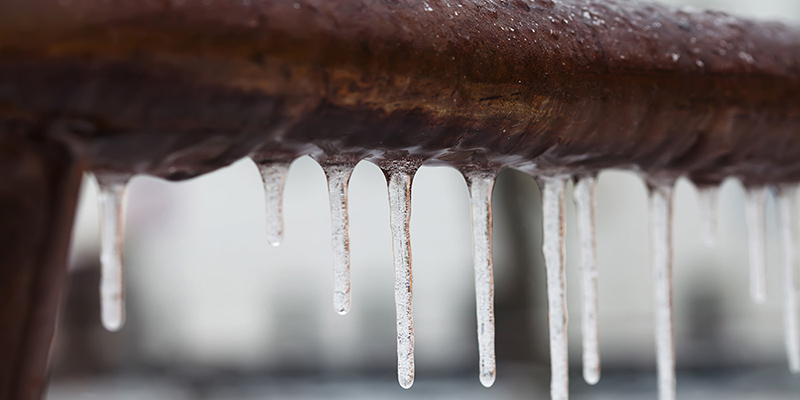Condo Frozen Pipes: Who Should Take Care Of It?
January 6, 2025


Condo frozen pipes are a common problem among many condo associations, particularly those located in colder states. But, is it your job to fix these pipes? Or, is someone else accountable for them?
DEALING WITH CONDO FROZEN PIPES
Every season has its range of weather-specific concerns for property owners and condominium associations. In the winter, that includes the risk of water damage and frozen pipes on the property. But, dealing with freezing drain pipes is something a lot of condo associations must do. In fact, some associations encounter this problem on a yearly basis.
When condo frozen pipes occur, you must immediately take action. This way, you can prevent further damage from taking place. Beyond looking for a solution, though, most people are concerned with the cost of repairs. Particularly, who will cover them?
WHO IS RESPONSIBLE FOR REPAIR OF WATER PIPES IN CONDOS?
The first thing you must do is check your condo association’s governing documents. Not all associations have the same rules when it comes to repairing frozen pipes in condos, so it is best to refer to these documents first instead of looking for a blanket solution. Your association could have specific guidelines on how to deal with condo frozen pipes. If not, there are some general rules that apply:
- Unit Owner’s Responsibility. The unit owner must cover the repair of the pipe if the leak exists in a section of the pipe that serves only that unit.
- Condo Association’s Responsibility. On the other hand, if the pipe is located in a mainline or serves more than one unit, then the condo association must cover the cost of repairs.
If your governing documents don’t include these stipulations, then it’s probably time to consider amending them. Some associations have outdated governing documents which can include unenforceable rules. A good way to ensure homeowners understand and agree with this type of responsibility is to outline them in the bylaws.
Of course, changing rules and covenants isn’t an easy job. Some state laws require cooperation from homeowners to make any changes, and homeowners can even reverse rules in others. When crafting your amendments, make sure to consult your association’s attorney to help with the wording. This way, you can ensure these changes don’t come into conflict with the law or other rules in the governing documents. It’s also a good way to protect your condo association from liability.
PREVENTING FROZEN PIPES IN CONDOMINIUMS
Frozen pipes happen when outside temperatures reach freezing and there is a lack of heat inside the property. Then, the water freezes and can cause the pipes to crack or burst.
It’s important to remind residents that even if they are going on vacation during the winter season, turning down the heat too much can negatively affect their pipes.
It’s also a good idea to install pipe insulation to protect the pipes and avoid freezing. Seal any cracks and crawl spaces to prevent drafts from getting into your water systems. Simply applying heating tape on the pipe can also work wonders.
These small actions may not seem like much, but they can really add up in the long-term. After all, prevention is better than the cure, and it’s also less of a hassle to do.
Sometimes, though, pipes still freeze. In that case, when you can safely do so, take action to decrease the chance of damage by drying out any areas that were damaged or affected by the cold/wet weather. Keep a lookout for any homes that have water flowing out, especially if you know the owner isn’t home.
If that’s the case, call 911 right away, as this is more efficient than contacting an association contractor. Then, call your HOA manager for additional steps.
WHEN IS CONDO INSURANCE INVOLVED?
In terms of insurance, it really is a case-to-case basis. The amount of damage — whether to the unit or to common elements — may be below the association’s insurance deductible. In that case, the condo unit owner must get in touch with their insurance provider.
They must then file a claim with them to cover the cost of repairs to the unit. This includes any personal property damaged in the process. The association, on the other hand, will shoulder the cost of damages to the common elements (if any). The same goes for any repairs required to the common elements.
Conversely, the amount of damage may be more than the association’s insurance deductible. In this scenario, the association’s insurance provider will typically cover the cost of repairs for both the common elements and the unit itself. Damages to personal property, though, should still fall under the condo unit owner’s responsibility. This includes damages to any clothes, furniture, electronics, artwork, and other personal items.
As for the deductible, the association may not need to shoulder the full cost of it. The association and the unit owner involved will share the cost of the deductible depending on the percentage of damage. If the unit experienced 10% of the damage while the common elements experienced 90%, the deductible will be divided as such. In that case, the association will shoulder 90% of the deductible while the unit owner will only pay 10% of it.
Every condo association must have comprehensive insurance policies to protect the community. Typically, insurance will cover the cost of condo frozen pipes. Still, you should ask your insurance provider whether it’s included in your policy. If you don’t have proper insurance yet, the time to act is now. Consider hiring an HOA management company to help.
PREPARE YOUR COMMUNITY FOR WINTER BLUNDERS
Dealing with condo frozen pipes can be a headache, which is why it’s important for your association to take preventive measures, particularly if you live in a state with cold winters. Sometimes, though, no matter what you do, pipes still freeze. In that case, check your governing documents for the proper procedures. Trace the source of the leak and talk to your insurance provider about covering the cost of repairs.
It’s important to know that pipes aren’t the only things that become vulnerable in the winter. Take the proper steps to winterize your community, and you’ll be good to go.







Leave a Reply